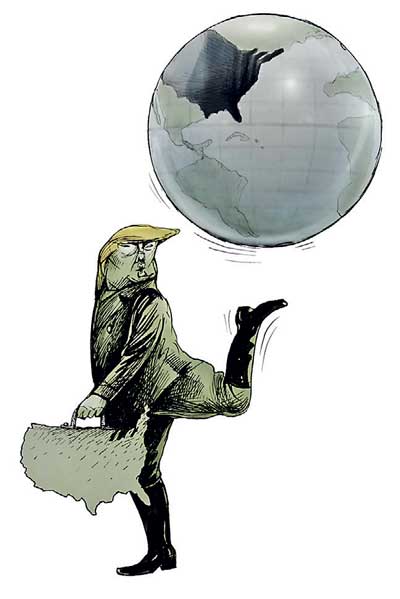Sunday Feb 22, 2026
Sunday Feb 22, 2026
Tuesday, 23 January 2018 00:00 - - {{hitsCtrl.values.hits}}
TOKYO (Reuters): Wall Street stock futures and the dollar pulled back slightly on Monday after the U.S. government was forced to shut down amid a dispute between President Donald Trump and Democrats over immigration.
But Asian shares remained resilient overall while U.S. bond yields continue to rise as investors saw limited economic fallout from the standoff in the U.S. capital.
European stock futures are mostly opening slightly higher, with Dax futures up 0.2%, and France’s Cac futures up 0.05%. Britain’s FTSE futures are down 0.1%.
“After all, people know this is just a political show. Neither Republicans nor Democrats can afford to keep dragging their feet for long ahead of mid-term elections this year,” said Masashi Murata, senior currency strategist at Brown Brothers Harriman in Tokyo.
MSCI’s broadest index of Asia-Pacific shares outside Japan managed to erase slim losses earlier to eke out gains of 0.1%, hitting a record high for six days in a row. Japan’s Nikkei also ended up 0.03 point.
U.S. S&P500 mini futures dipped just 0.1%, still clinging near a record high hit on Friday.
A U.S. government shutdown will enter its third day on Monday as Senate negotiators failed to reach an agreement late on Sunday to restore federal spending authority and deal with demands from Democrats that young “Dreamers” be protected from deportation.
The Senate set a vote for 12 p.m. (1700 GMT) on Monday on advancing a measure to provide temporary government funding through Feb. 8, end the shutdown and allow hundreds of thousands of federal employees to return to work.
But it was unclear whether there would be enough Democratic votes on Monday to advance a temporary spending bill.
While many see minimal impact on the economy from a short-term government shutdown, analysts say a prolonged stalemate in Washington could dampen investors’ confidence in U.S. assets.
“The markets had not expected this shutdown. Given that U.S. share prices have rallied strongly since the beginning of the year, we have to see if this event is a trigger to change the market trend,” said Takafumi Yamawaki, head of Japan fixed income research at JPMorgan Securities.
Yamawaki noted that during previous government shutdowns - two in 1995 and one in 2013 - U.S. bond yields have tended to slip in the first few weeks after the closure.
But so far U.S. Treasuries yields have risen despite the government shutdown, extending their uptrend since September.
The benchmark 10-year yield rose to as high as 2.672% , its highest level in 3-1/2 years. A clear break above its double top marked in December last year and March could signal a further rise in the yield, analysts say.
In the foreign exchange market, the dollar’s index against a basket of major currencies dropped about 0.2% from late last week to 90.465, not far from three-year low of 90.104 touched on Wednesday, before edging back to 90.63.
The euro opened the day 0.4% higher at $1.2275 , but it stopped short of testing Wednesday’s three-year peak of $1.2323 and pared back much of the gains to trade at $1.2225.
The common currency was also helped after Germany’s Social Democrats (SPD) voted on Sunday to begin formal coalition talks with Chancellor Angela Merkel’s conservatives, moving Europe’s economic powerhouse closer to a stable government after months of political deadlock.
The safe-haven Swiss franc gained 0.3% to 0.9619 franc per dollar. It hit a four-month high of 0.9536 to the dollar on Friday.
The Japanese yen was little changed at 110.83 yen to the dollar, not far from Wednesday’s four-month high of 110.19.
The South African rand was the biggest mover in Asian trade, rising almost 1% at one point to 2-1/2-year highs of 12.0825 per dollar.
Leaders of South Africa’s ruling African National Congress (ANC) met on Saturday to outline the party’s programme for the coming year amid reports that its executive planned to force Jacob Zuma to quit as the country’s president.
Moving in the opposite direction, the Turkish lira eased 0.6% to 3.8280 after Turkey’s army and rebel allies battled U.S.-backed Kurdish militia in northern Syria, in a campaign that has opened a new front in Syria’s civil war.